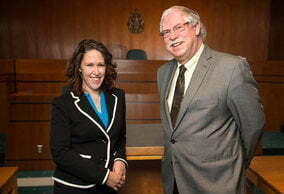
Law student Brittany Doucet, with law dean Philip Bryden, is doing her part to help bring legal services to rural areas
At some point between birth and death, life calls for at least some legal services. But for rural Albertans, who, like their urban cousins grapple with everything from wills to business deals, vital access to a lawyer isn’t a given.
That’s why the University of Alberta Faculty of Law is teamed up in an ongoing collaboration with the Alberta Rural Development Network (ARDN), the University of Calgary law school and other partners including the Canadian Bar Association on the Alberta Regional and Rural Access to Justice Project. The project, started in 2011, is exploring the shortage of legal services for Albertans who live outside of the province’s cities and towns—where most law firms are established.
Though bread and butter legal services may rank low in the public eye on the ladder of community must-haves, compared to something like health care, they are just as important when life events happen, says Philip Bryden, dean of the U of A Faculty of Law.
“People go without legal services, and when they go without, there are consequences,”
Bryden said. “Lawyers are often seen as people who take up time and make processes difficult, but in fact, what we do is make it easier for people to get what they are entitled to and get a fair resolution of their problems.”
The U of A plays a vital role by drawing attention to careers in regional and rural Alberta, said Paul Watson, research director for ARDN. The group is currently researching the human costs of going without legal services, as well as the financial ones. Part of the solution is to attract newly-minted lawyers to rural areas, he said. “We want to build momentum in making sure students are aware there are opportunities out there. The U of A as an educator has been actively working to make students aware of rural practice.”
“Though bread and butter legal services may rank low in the public eye on the ladder of community must-haves, compared to something like health care, they are just as important when life events happen”
Without new lawyers to replace rural Alberta’s “graying bar”, sustainability of smaller communities suffers, creating disincentives for people to live rurally, Watson said. “There are so many commonplace issues—family matters, divorces, wills, real estate and business dealings—that call for legal expertise.”
That variety is one of the things that convinced U of A law student Brittany Doucet to head for rural Alberta, where she will article with a Medicine Hat firm.
“I will get to handle a diversity of issues, which makes for an interesting articling experience, and because there are fewer lawyers than at a big firm, I’ll have to do a bit of everything.”
Doucet grew up in Calgary but likes the idea of settling in a smaller community.
Heavily involved in activities ranging from playing rugby to presenting an annual play with her fellow law students, Doucet wants to feel connected to her community and colleagues, and feels rural Alberta is right for that. “It’s easier to get to know people and to get involved in community service. And the legal community will be smaller, so I’ll get to know my colleagues well.”
“If all of our graduates are going to Edmonton or Calgary, what happens to the legal profession in other communities?”
Programs in the U of A Faculty of Law geared to rural opportunities are showing success, said Patricia Neil, career development officer.“Student interest in going to rural Alberta has steadily risen over the years. We have had students article this past year all over the province, in Sundre, Camrose, Red Deer, Lacombe, Lloydminster, Grande Prairie, Peace River and Lethbridge.”
Annual events include a one-day firm hop, which lets students visit up to five law firms in a community such as Red Deer, a small firm career day that brings firms from across Alberta to the U of A law school to meet students, and a seminar which features lawyers and alumni from rural areas as guest speakers who talk about what it’s like working and living in smaller communities. As well, students do a one-day job shadow with area firms, most recently in Fort Saskatchewan and Wetaskiwin.
Paired with the needs of rural clients is the concern for continuity of law firms outside the large cities, Bryden noted. Law practices are stewards of important enduring documents, so succession is important.
“If all of our graduates are going to Edmonton or Calgary, what happens to the legal profession in other communities?”
Law schools such as the U of A and the U of C will have to work together and with the law profession to remove barriers to accessibility in rural areas, Bryden added. “It is a complex situation—there are issues of geography, issues of cost. One of the challenges of the profession is how technology is evolving, and how are we using it to potentially serve more people?”
Business education may also be a way to help address the problem, by teaching law graduates how to run a sustainable rural practice while providing affordable service to clients. “We see that as a new challenge for how we think about the legal profession and how we prepare students for professional practice.”
This article and photograph were originally published on December 6, 2013 as a news article on the University of Alberta website. It is reprinted with permission.

